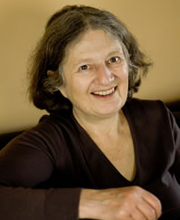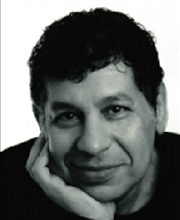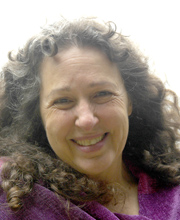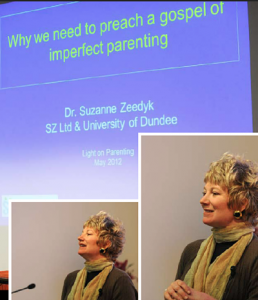NAOMI STADLEN
 This author of What Mothers Do — Especially When It Looks Like Nothing changed the tone from the statistical, socio-biological, and clinical bent of the morning session to the immediacy of direct experience and the narrative of mothers about the “special time” in the early months after baby’s arrival. She highlights the importance of a parent’s sense-making of the early months, marked by such themes as an “extraordinary mixture of chaos and love,” “…like being inside a bubble…” “…like having a thin skin enclosing themselves and their babies buffering them from the rest of the world…”
This author of What Mothers Do — Especially When It Looks Like Nothing changed the tone from the statistical, socio-biological, and clinical bent of the morning session to the immediacy of direct experience and the narrative of mothers about the “special time” in the early months after baby’s arrival. She highlights the importance of a parent’s sense-making of the early months, marked by such themes as an “extraordinary mixture of chaos and love,” “…like being inside a bubble…” “…like having a thin skin enclosing themselves and their babies buffering them from the rest of the world…”
“I don’t go to that deep level of sleep anymore. However tired I am I seem to sleep lightly enough to hear the baby stir.”
“One day you’ve just begun to get a grip and the next day you fall back down into the chaos again.”
“It was so hard at first. I was at home with my baby and I couldn’t understand what he wanted. My mum and my partner and I thought it was gas, so we took turns walking him. But then I realized he was tired and we were overstimulating him!”
Stadlen says, “If we focus only on the practical, I fear that a whole dimension is being missed. The words sacred and holy aren’t really available to us anymore, but we need something that can help us frame a more spiritual dimension to some of these heart-melting moments.”
“You can see a little bit of their soul right after they’re born”
“After the birth, you look at the strange person in your arms and you wonder, “Where did you come from?”
“Her eyes are like two planets looking at me.”
Stadlen urges, “Mothers need to be able to slow down so they can notice their children. But it’s hard. Mothers need support and so often they don’t have that time.”
She notes, “Many mothers in the early months feel like they’re failing, but they’re not failing. We in our culture value being in control, being in the know. But the shock and chaos and being out of control are not necessarily bad experiences. They can be good. In that place, it is possible to draw closer to the essential mystery of a person. I think that may be what I’m hearing when I hear mothers expressing sadness when those first few months have passed: our culture doesn’t really support them in allowing themselves to be in that not-knowing place where they can draw in closer and deeper with this new baby — and now there’s a certain loss they feel when that is gone.”
“They also feel like they’re letting the feminist movement down, when in reality the feminist movement has led them down.”
MENIS YOUSRY
 “The Essence of Parenting ~ How Can Parents Become Influential Rather Then Influencing?” What a delightful and inspiring talk by this family therapist. He said if he had to give his talk in just one sentence, it would be borrowed from Gandhi: “My life is my message.” I adored listening to Yousry, because he is inspiring and delightful as a speaker, and also because what he had to say was so congruent with many passages in my own book: we don’t teach or guide our children through what we say, but through who we are. As I have often said to parents in my practice, if you can look in the mirror and say Yes, I am worthy of my child’s unquestioning imitation, then 97% of discipline issues never arise. (But no worries — we don’t have to be perfect! The power of striving is a key piece on which I write and speak, including in my recent blog tour. I even enticed Dr. Yousry — whom I soon gathered is a bit of a rock star here — to change his plans and return tomorrow to hear my closing talk which highlights the neuroscience of striving and how it changes our legacy to our children.)
“The Essence of Parenting ~ How Can Parents Become Influential Rather Then Influencing?” What a delightful and inspiring talk by this family therapist. He said if he had to give his talk in just one sentence, it would be borrowed from Gandhi: “My life is my message.” I adored listening to Yousry, because he is inspiring and delightful as a speaker, and also because what he had to say was so congruent with many passages in my own book: we don’t teach or guide our children through what we say, but through who we are. As I have often said to parents in my practice, if you can look in the mirror and say Yes, I am worthy of my child’s unquestioning imitation, then 97% of discipline issues never arise. (But no worries — we don’t have to be perfect! The power of striving is a key piece on which I write and speak, including in my recent blog tour. I even enticed Dr. Yousry — whom I soon gathered is a bit of a rock star here — to change his plans and return tomorrow to hear my closing talk which highlights the neuroscience of striving and how it changes our legacy to our children.)
Taking off his therapist hat and putting on his parent hat, he reported, “When I was trained to be a family therapist it took many years, I attended lectures, wrote reports, got supervision, had lots of support. But becoming a parent, suddenly one day, I simply became a parent.” Yousry slyly corrected himself, making an important point — what I think is one of the greatest challenges in parenting: “Actually, no, I was trained — by how I was parented.” (Marcy’s aside: Indeed, that old trope that baby’s don’t come with parenting manuals couldn’t be more wrong: our parenting manuals are programmed in us when we ourselves are children!)
Yousry’s bottom line is congruent with such attachment neurobiology pioneers as Dan Siegel: “If we want to help our children we need to work on ourselves.” We want our children to be inspired by us, not to be “trained” by us.” He shared his five habits for success:
gratitude
acceptance
respect
letting go (with)
happiness
He makes a strong point that what children most deeply want… what makes them feel most safe, content and secure… is the parents’ happiness!
During the Q&A, Yousry made this point which I just loved: Compassion includes an understanding of a lack of understanding!
NAOMI ALDORT
 Having left her notes for an entire tour of presentations at her last stop, Naomi simply stood and delivered in her patented forthright way. Her topic was “Raising Our Children, Raising Ourselves” (title of one of her books). There were many gems here, so here are some, in no particular order:
Having left her notes for an entire tour of presentations at her last stop, Naomi simply stood and delivered in her patented forthright way. Her topic was “Raising Our Children, Raising Ourselves” (title of one of her books). There were many gems here, so here are some, in no particular order:
Sometimes this material can tend to make us as parents feel guilty. Her advice to to simply notice the sense of guilt, and then to forgive yourself. (To which she added this rather profound idea — that forgiving is actually realizing there is nothing to forgive.)
Your child is always right — meaning, they always have an absolute, valid reason to do what they do. And your job is to find out how/why (which is not to say you allow the behavior to continue — simply that this realization completely changes our response). When she hits her baby brother, your job is to allow her to not have the need to do that.
“You burned the rice” is Naomi’s shorthand for addressing and forgiving our shortcomings as parents. We don’t berate ourselves or flagellate with excessive guilt when we burn the rice; it happens. We get distracted, or put too little water in the pot, whatever.
The culture we live in is about how we shape people to live in the culture. We’re not here to shape human beings; we’re here to protect who they already are. Protecting their self-trust, self-joy, and exuberance.
Obedience is not the goal; obedience is insecurity. The obedient child is manipulated.
Freedom is not license. (A child can and should be free to want video games and chocolate; this does not equal her license to have them!)
In response to a question about how when one is rested and available, all this is well and good, but what about when it becomes consuming and there’s no time for the parent herself, Aldort invited us to question the thought (the perception, which I define as the story we tell ourselves about what’s going on) that “nurturing time for me needs to be by myself.” She suggests that “When you can really be present with the child, that is VERY nurturing!! It’s having all the background thoughts going on — ‘I’ve got bills to pay’… ‘I’ve got to think of something to make for dinner…’ — that tires and saps you!” So it’s about mindfulness, about presence (another value I treasure, as it’s #1 principle in Parenting for Peace)!
That wraps us this installment from “Light on Parenting”!
** Update as of May 24 **
 It was all I could do to keep up with the rich amount of content by the 2nd day, and any hopes of blogging about it slipped away early on! I was incredibly honored to close out the conference on a day that included such speakers as Michel Odent, raising provocative questions about postpartum depression in fathers; Kerstin Uvnäs Moberg, sharing her important research on oxytocin and motherhood; and the dynamic Suzanne Zeedyk and how she’s using her new film the connected baby to change hearts, minds and policy throughout the UK. Suzanne’s photographer Brett made this photojournal of some of the afternoon speakers, and I’m particularly happy that he captured me leading the audience in some BrainGym. We all needed it after sitting for so much heady stuff!!
It was all I could do to keep up with the rich amount of content by the 2nd day, and any hopes of blogging about it slipped away early on! I was incredibly honored to close out the conference on a day that included such speakers as Michel Odent, raising provocative questions about postpartum depression in fathers; Kerstin Uvnäs Moberg, sharing her important research on oxytocin and motherhood; and the dynamic Suzanne Zeedyk and how she’s using her new film the connected baby to change hearts, minds and policy throughout the UK. Suzanne’s photographer Brett made this photojournal of some of the afternoon speakers, and I’m particularly happy that he captured me leading the audience in some BrainGym. We all needed it after sitting for so much heady stuff!!
*******
By Marcy Axness, PhD, author of Parenting for Peace: Raising the Next Generation of Peacemakers
Tags: feminist movement, interpersonal neurobiology, mothering, parenting, postpartum


